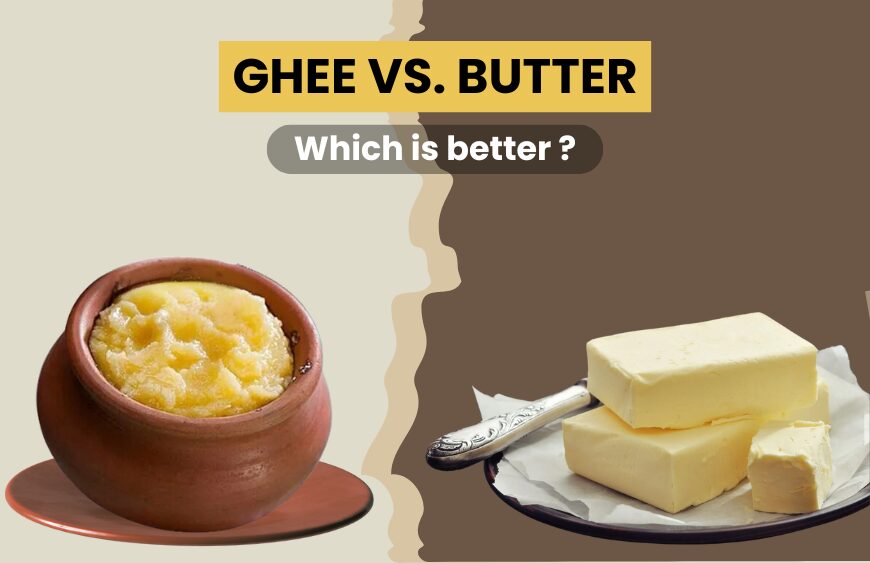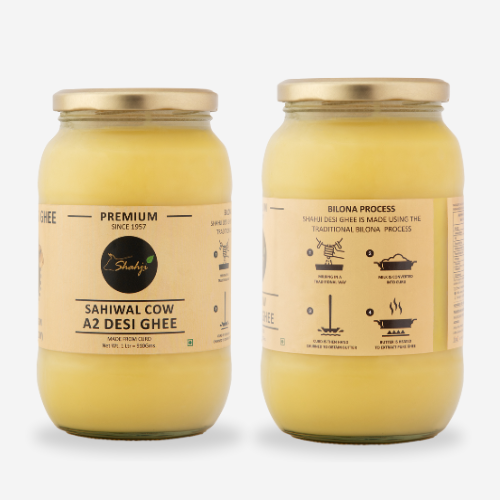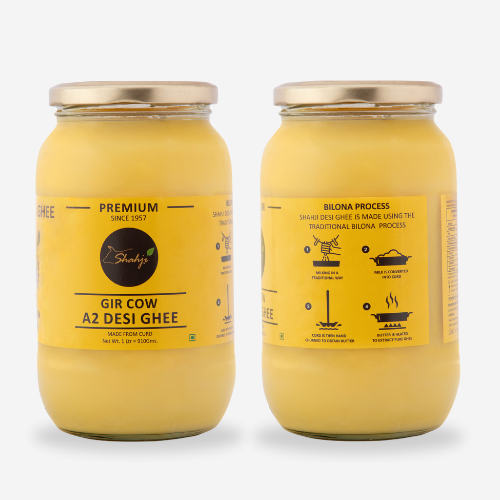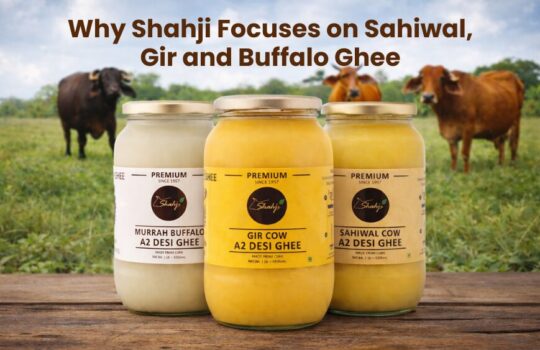Ghee Vs Butter: Which is Better? – Shahjighee

Ghee vs Butter: Many a time, you’ll find yourself stuck between these two choices, wondering which is better. While both are widely used in cooking and baking, they have distinct differences in terms of nutrition, health benefits, and taste. Let us clearly understand the differences between ghee and butter to help you make an informed choice.
What is Ghee?
Ghee is derived from butter. It is a higher form of clarified butter with limited dairy proteins as compared to regular butter.
While making a “difference between butter and ghee”, if you remove milk solids and water from butter, the resultant substance will be ghee. The best thing about ghee is that it has been used since ancient times to prepare Ayurvedic medicines.
Benefits of Ghee
- Ghee is now trending as new super food. The truth is that it keeps your gut healthy.
- It is a source of good fats and is superb for your skin and hair too!
- Healthy and monitored doses of ghee are actually being recommended by nutritionists around the world.
- Ghee can be had in small quantities daily as a source of saturated fats.
- Children can afford to have a larger quantity every day.
Now, let’s understand
What is Butter?
Butter is made by churning milk and separating the solids (butter fat) from the liquid (butter milk). Butter contains a high concentration of fat that gives it a rich and creamy texture.
- The butter that you get today in the market is an emulsion of milk fat in water with milk proteins acting as emulsifying agents.
- It’s processed and has added salt.
- Butter is often used as a substitute for oil in cooking, especially when it comes to sautéing vegetables because it adds a unique and pleasing flavour to foods.
- It is one of the most useful ingredients in baking as well.
Ghee Vs Butter : Nutritional Facts
Ghee |
Butter | |
calories |
123 |
100 |
Fat |
14 Grams |
11 Grams |
Saturated Fat |
9 Grams |
7 Grams |
Monounsaturated Fat |
4 Grams |
3 Grams |
Polyunsaturated Fat |
0.5 Grams |
0.5 Grams |
Proteins |
Trace Amounts |
Trace Amounts |
Carbs |
Trace Amounts |
Trace Amounts |
Vitamin A |
13% of Daily Value |
11% of Daily Value |
Vitamin E |
3% of Daily Value |
2% of Daily Value |
Vitamin K |
1% of Daily Value |
1% of Daily Value |
Ghee Vs Butter : Nutritional Difference
Ghee |
Butter | |
Lactose Intolerant |
Undetectable Lactose level |
It has 685 Milligrams of the Lactose level |
Cardiovascular benefit |
Eliminates toxins out of the cells and lowers bad cholesterol level |
One spoon of butter every day doesn’t affect heart health |
Keeps you healthy |
Ghee has antibacterial and antiviral properties that ensure that you won’t fall sick and while the antioxidants in it make your skin healthy. Ghee lubricates and oxygenates joints promoting bone health. Ghee helps and delivers nutrients to vital organs like the brain. |
White butter has antibacterial and antiviral properties. It also has pro-regenerative capacity |
Ghee Vs Butter : What is Difference?
Ghee |
Butter |
|
Ghee has a high smoke point. It doesn’t burn very quickly. It can keep up the heat up to 485°F |
Butter has a low smoke point and it burns at 350° F |
|
Ghee is lactose free. ghee is a better choice for people sensitive to dairy properties |
butter has relevant quantities of lactose |
|
Ghee doesn’t produce higher amounts of Acrylamide |
Acrylamide is a chemical that inculcates cancer risk in humans. It is formed when starchy products like butter are heated |
|
Ghee includes fatty acid known as butyrate acid, which is good for digestion and has positive inflammatory effects |
Butter does not contain this fatty acid, called butyrate acid |
|
Ghee is sodium free |
butter contains 3 mg sodium per spoon |
|
ghee provides 850 kcal with no trans-fat. |
A 100 g butter provides 750 kcal with 4 gm of trans fat |
|
Ghee doesn’t contain milk, protein and sugar |
Butter contains milk, protein and sugar, making it more challenging to break down, especially dairy sensitive. |
| Ghee is nuttier | butter is slightly salty and creamier |
In terms of health and nutrients, ghee is rich in its content
- Always keep in mind, it’s not just ghee and butter but your overall diet that influences fat or cholesterol levels
- Exercising regularly
- And including more fruits and vegetables in your diet can help you maintain balanced cholesterol, while relishing your spoon of ghee.
Taste difference between Ghee and Butter
When it comes to taste, the difference between ghee and butter is poles apart. Ghee is nuttier while butter is slightly salty and creamier. Benefits of ghee and butter cannot be denied, when you’ve them in controlled quantity, but ghee takes the lead, if you compare.
In terms of health and nutrients, ghee is rich in its content
Always keep in mind, it’s not just ghee and butter but your overall diet that influences fat or cholesterol levels. Exercising regularly and including more fruits and vegetables in your diet can help you maintain balanced cholesterol, while relishing your spoon of ghee.
Also Read –
Frequently Asked Questions – FAQs
What is the key difference between ghee and butter?
Ghee and butter may seem similar, but they differ significantly in composition and usage. Ghee is clarified butter with milk solids and water removed, making it lactose-free and ideal for people sensitive to dairy. It has a higher smoke point (485°F), making it better for high-heat cooking, while butter has a lower smoke point (350°F). Additionally, ghee contains butyrate acid, which promotes digestion and reduces inflammation, whereas butter does not. Ghee also has a nuttier flavor compared to the creamy and slightly salty taste of butter.
Which is healthier: ghee or butter?
Ghee is often considered healthier than butter due to its unique properties. It is rich in butyrate acid, which improves digestion and reduces inflammation, while also providing antioxidants that support skin health and immunity. Ghee is free of trans fats and lactose, making it suitable for individuals with lactose intolerance. On the other hand, butter contains trans fats, lactose, and sodium, which can be less suitable for people with certain health conditions. However, consuming either in moderation as part of a balanced diet is key to maintaining health.
Can lactose-intolerant individuals consume ghee?
Yes, ghee is safe for lactose-intolerant individuals because the lactose and milk proteins are removed during its preparation. Ghee undergoes a clarifying process that eliminates these components, making it a suitable option for people sensitive to dairy. In contrast, butter contains detectable levels of lactose, which can cause discomfort for lactose-intolerant individuals.
How does ghee support gut health?
Ghee is rich in butyrate acid, a short-chain fatty acid that promotes gut health by nourishing the cells of the intestinal lining. It also has anti-inflammatory properties that help reduce irritation and inflammation in the digestive tract. Regular consumption of ghee in small quantities can improve digestion, boost metabolism, and promote a healthy gut microbiome.
Why is ghee preferred for cooking over butter?
Ghee is preferred for cooking because of its high smoke point (485°F), which allows it to withstand high temperatures without breaking down or producing harmful compounds. This makes it ideal for frying, sautéing, and roasting. Butter, with a lower smoke point (350°F), tends to burn quickly, making it less suitable for high-heat cooking. Additionally, the nutty flavor of ghee enhances the taste of dishes, especially Indian and traditional recipes.
Is ghee better for heart health compared to butter?
Ghee, when consumed in moderation, is considered better for heart health because it contains healthy fats that can help lower bad cholesterol (LDL) and increase good cholesterol (HDL). It also contains Omega-3 fatty acids that promote cardiovascular health. Butter, on the other hand, contains trans fats and higher levels of sodium, which can negatively affect heart health if consumed in excess.
How does the nutritional content of ghee differ from butter?
Ghee is more concentrated in fats and nutrients compared to butter due to the removal of water and milk solids during its preparation. Ghee contains higher levels of saturated fat, vitamins A, E, and K, and butyrate acid, which are beneficial for overall health. Butter, while also rich in fats, includes milk proteins, lactose, and sodium, which can be less favorable for individuals with dietary sensitivities or health concerns.
Can ghee help with weight management?
Yes, ghee can support weight management when consumed in moderation. The healthy fats in ghee help improve metabolism and provide long-lasting energy. Ghee also contains conjugated linoleic acid (CLA), which is known to aid in reducing body fat. However, portion control is crucial, as excessive consumption can lead to weight gain due to its high caloric content.
Does ghee have any skincare benefits?
Absolutely! Ghee is known for its excellent skincare properties. Its antioxidants and fatty acids nourish the skin, keeping it hydrated and glowing. Ghee can also be applied topically to soothe dry or irritated skin. In Ayurvedic medicine, ghee is often used as a natural moisturizer to improve skin texture and reduce signs of aging.
Conclusion
The difference between ghee and butter is not huge one. Still, it can drive the taste of your dishes. Ghee is mostly recommended for people on diet and allergic to dairy products.
Butter is good alternative, if you’re someone really addicted to buttery taste. Although ghee performs well in most cases. Benefits of ghee and butter cannot be denied, when you’ve them in controlled quantity, but ghee takes the lead, if you compare.











